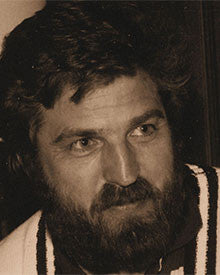
(1947 - 2001)
Nikolai Korndorf was a Russian and Canadian composer and conductor. He was prolific both in Moscow, Russia and in Vancouver, Canada. He studied composition with Sergei Balasanyan at the Moscow Conservatory. Korndorf completed post-graduate studies in 1973 with his opera Feast in the Time of Plague after Alexander Pushkin. He studied conducting with Leo Ginsburg from 1967 to 1979 and taught composition and orchestration at the Conservatory from 1972 to 1991. He became a member of the Union of Composers in 1973 and later a member of the Moscow Presidium of the Soviet Composers' Union. His early works were written in a traditional academic manner until he adopted an atonal post-expressionist style. Later he turned to a kind of minimalist repetitive aesthetic already notable in his Confessiones for double bass and twelve wind instruments, and Jarilo an extensive piece for piano and tape. This line was developed in his large-scale works such as three Hymns, his 3rd and 4th Symphonies and an opera MR (Marina and Rainer) based on correspondence between Marina Tsvetaeva and Rainer Maria Rilke.
Nikolai Korndorf Composition Timpani and Percussion Requirements
Da
No Timpani + 1 percussion
Vibraphone, 5 suspended cymbals, tubular bells, Russian bells
__________________________________________________________________________________
Hymn III
Timpani + 3 percussion
Orchestral bass drum, 2 tam tam, glockenspiel, vibraphone, tubular bells, tuned gongs (Db3-C4)
__________________________________________________________________________________
Sempre Tutti
3 Timpani + 8 percussion
1) glockenspiel, 4 tom toms, 2) tubular bells + low Bb & B, tom tom, 3) snare drum, 4) orchestral bass drum 1, 5) orchestral bass drum machine, 6) suspended cymbal, large and small tam tams, 7) clash cymbals, 8) orchestral bass drum 2, 2nd Timpani + whip, triangle
__________________________________________________________________________________
